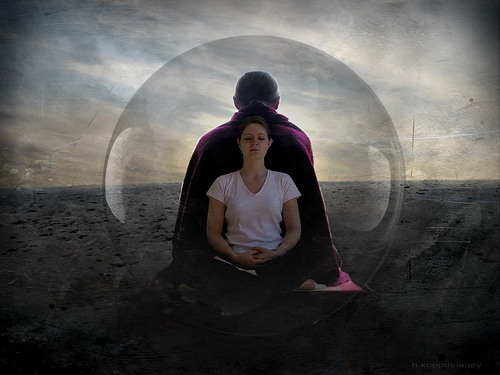Recently, I invested 10 days in silence and meditation at a Vipassana meditation retreat.
Vipassana Meditation is a method taught by Gautama the Buddha—The Enlightened One.
The method is stripped of all religious rite and rituals and accessible to anyone who is willing to surrender themselves to 10 days of isolation. Your basic needs are met by a team of servers in a comfortable retreat center located far from the bustle of everyday life.
Your only duty is to show up, sit down and just be.
But this experience was far from easy, and was in no way an escape.
My integration back into the “world” after experiencing such deep self-exploration during my time at the Dhamma Center brought on an intense fatigue. This brand of fatigue is borne of and brings to light the dark spots I found within myself during my initial Vipassana journey.
While I played out most of my life over the course of 180 hours of waking silence, one major revelation was that I have a deep aversion towards myself.
This discovery has shown me the root of much of my suffering.
In processing (on an intellectual level) what it would look like to bring oneself out of personal aversion, we would probably default to the ideas of self-love, acceptance and focusing on the good qualities we have cultivated.
But, I’m finding the opposite to be true.
While our conditioning directs us towards elevating ourselves, my healing has directed me towards humility.
The aversion towards myself is based on what I accomplish (or don’t accomplish) and the approval of others.
But the remedy for this affliction doesn’t involve healing at this external level. The key is to detach completely from needing approval and craving accomplishment.
The aversion towards myself survives on the belief that this existence is “it.” We measure our worth by how we look, what we accomplish, who we impress, how much money we accumulate and what we believe we can control.
And this fallacy absolutely consumes us.
The problem with the belief in the external tangibles is that they all change and eventually fade away.
We attach ourselves to jobs that will end, bodies that will decay, relationships that will dissolve and the illusion of money.
We combine all of these tokens of identity and say that this is who we are. It’s no wonder that we are a culture of the medicated and numb when we build our sense of existence and worth on externals that are 100 percent guaranteed to let us down and cause suffering.
So, my reconciling an aversion to myself doesn’t look like propping up the structures that caused the suffering in the first place. It looks like going completely around and under them.
Humility takes the wind out of the ego.
Humility refuses to play the game of this human experience (at least at the level that our ego-dominated culture would have us play).
Humility stops worrying about itself and looks outward in service to others. It stops wondering if it’s doing enough, educated enough, busy enough, pretty enough, fit enough, young enough, spiritual enough, wealthy enough, accomplished enough, sexed enough, respected enough, satisfied enough, liked enough, loved enough or even if it has lived enough.
Humility fills all of these voids by refusing to need any of it.
But how does humility help an aversion towards myself?
Much of my own suffering in this life has come from having an aversion to the human population in general.
I don’t like other humans.
And all this time, I truly thought it was them. I thought they needed to change.
The joke in all of this is that I have an aversion to other humans because of the deep aversion I have to myself.
I tell my clients all the time that “we” are only projections of everyone else. No one sees you for who you are; they see you for who they think you are through the filter of their conditioning and personal dramas.
And my filter is that I don’t like myself. So, I don’t like “you.” (Don’t take it personally, it really has nothing to do with you.)
Fortunately, humility really doesn’t give a sh*t about what I like or don’t like.
It doesn’t care about my preferences or insecurities.
It only cares about love.
It only seeks to serve.
So, while my aversion to myself is playing out in my subconscious behaviors, I’m actively seeking humility on the gross level. Eventually, the gross humility will replace the subtle arrogance. And love will win.
As I deepen my Vipassana practice at home, I’m grateful for the tools I have learned through the silent work on myself.
Suffering occurs in the mind, and that is where we begin our work. We must get still enough to gain perspective of the entire show that we’ve been too wrapped up in to see clearly.
We’ve taken it to be our reality, when it’s simply a mirage of our conditioning and ego. My mind has had me pinned against myself on such deep levels that I’ve spent over 30 years battling everyone around me in an attempt to make it right again.
It may be scary to sit with ourselves and look inside.
It may be the most terrifying thing we ever do.
But, it’s in those terrifying acts that we reveal our true nature.
And mine—and yours—is love, not the mask of fear that we’ve been living under our whole life.
I stand in awe of and gratitude for Gautama, Sri Goenke, and those who keep the Vipassana and self-revelation tradition alive.
They have taught me selfless love.
I pray everyone who is ready for this step will have the courage to take it.
Relephant:
I Survived a 10 Day Silent Meditation Course.
Author: Mikela Rae
Apprentice Editor: Brandie Smith / Editor: Emma Ruffin
Photo: Hartwig HKD/Flickr









Read 1 comment and reply